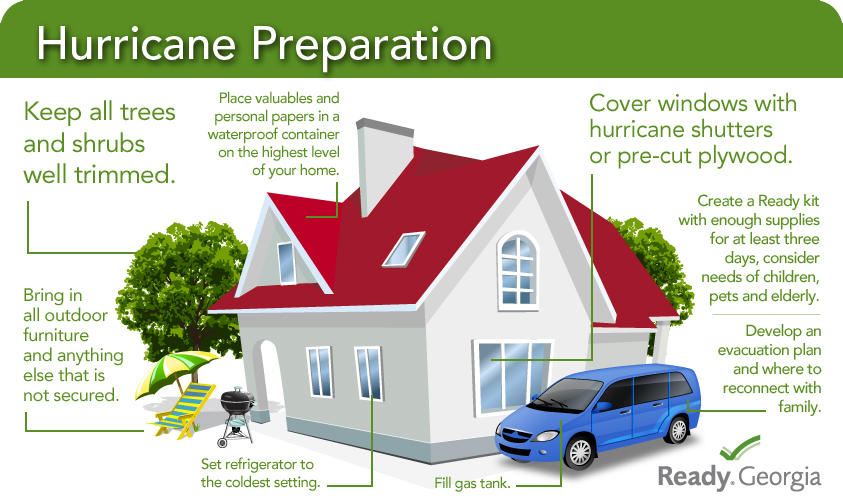
Hurricanes
As a coastal state, Georgia is at risk for hurricanes that form in the southern Atlantic Ocean, Caribbean Sea and Gulf of Mexico. Hurricanes can cause catastrophic damage hundreds of miles inland, so every resident should understand their risks and plan what to do in the event of an evacuation.
Before A Hurricane
- Get a Ready kit and prepare a portable Ready kit in case you have to evacuate.
- Make a family communications plan.
- Familiarize yourself with the terms that are used to identify a hurricane.
- A tropical storm/hurricane watch means sustained tropical storm (39 mph to 73 mph) / hurricane (74 mph and higher) force winds are possible within 48 hours. Be prepared to evacuate.
- A tropical storm/hurricane warning means sustained tropical storm (39 mph to 73 mph) / hurricane (74 mph and higher) force winds are expected within 36 hours. If local authorities advise you to evacuate, leave immediately.
- Make an evacuation plan for your family.
- Prepare to secure your property.
- Cover all of your home’s windows with hurricane shutters to protect them from high winds. Another option is to board up windows with 5/8” exterior grade or marine pre-cut plywood. Tape does not prevent windows from breaking.
- Plan to bring in all outdoor furniture, decorations, garbage cans and anything else that is not tied down.
- Keep all trees and shrubs well trimmed to make them more wind-resistent.
- If you have a car, fill the gas tank in case you have to evacuate.
- Plan ahead for your pets. Shelters cannot accept pets due to health reasons, so it’s important to find a pet-friendly hotel or make arrangements with family or friends in advance.
- Know your area’s flood risk – if unsure, call your local emergency management agency or planning and zoning department, or visit Flood Smart.
- Property insurance does not typically cover flood damage. Talk to your insurance provider about your policy and consider if you need additional coverage. The National Flood Insurance Program is designed to provide reasonable flood insurance in exchange for the careful management of flood-prone areas by local communities. The program, administered by FEMA, is available in hundreds of participating Georgia communities.
Check out our infographic for more tips on getting your home ready to weather the storm.

During A Hurricane
If a hurricane is likely in your area, you should:
- Listen to the radio or TV.
- Secure your home, close storm shutters and secure outdoor objects or bring them indoors.
- Turn off utilities if instructed to do so. Otherwise, turn the refrigerator thermostat to its coldest setting and keep its doors closed.
- Learn how to keep food safe in an emergency.
- Turn off propane tanks.
- Avoid using the phone, except for serious emergencies.
- Moor your boat if time permits.
- Have a supply of water for sanitary purposes such as cleaning and flushing toilets. Fill the bathtub and other larger containers with water.
You should evacuate under the following conditions:
- If you are directed by local authorities to do so. Be sure to follow their instructions.
- If you live in a mobile home or temporary structure – such shelters are particularly hazardous during a hurricane no matter how well fastened to the ground.
- If you live in a high-rise building – hurricane winds are stronger at higher elevations.
- If you live on the coast, on a floodplain, near a river, or on an island waterway.
- You should be able to move your valuables within 15 minutes.
If you are unable to evacuate, go to your safe room. If you do not have one, follow these guidelines:
- Stay indoors during the hurricane and away from windows and glass doors.
- Close all interior doors – secure and brace external doors.
- Take refuge in a small interior room, closet or hallway on the lowest level. If flooding occurs, be prepared to take shelter on a floor above the flooding.
- Avoid elevators.
After A Hurricane
- Local authorities may not immediately be able to provide information about what is happening and what you should do. However, you should listen to NOAA Weather Radio, watch TV, listen to the radio or check the Internet often for official news and instructions as they become available.
- Stay out of flood waters, if possible. The water may be contaminated or electrically charged. However, should you find yourself trapped in your vehicle in rising water get out immediately and seek higher ground.
- Be alert for tornadoes and flooding. If you see a funnel cloud or if local authorities issue a tornado warning take shelter underground or in an interior room away from windows. If waters are rising quickly or local authorities issue a flood or flash flood warning, seek higher ground.
- Stay away from downed power lines to avoid the risk of electric shock or electrocution.
- Do not return to your home until local authorities say it is safe. Even after the hurricane and after flood waters recede, roads may be weakened and could collapse. Buildings may be unstable, and drinking water may be contaminated. Use common sense and exercise caution.